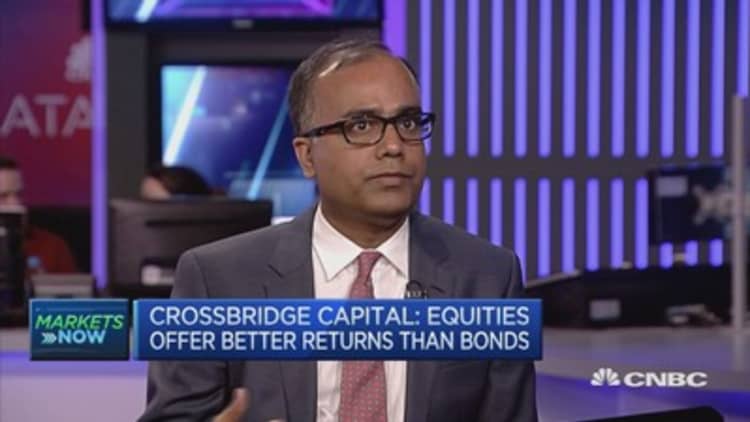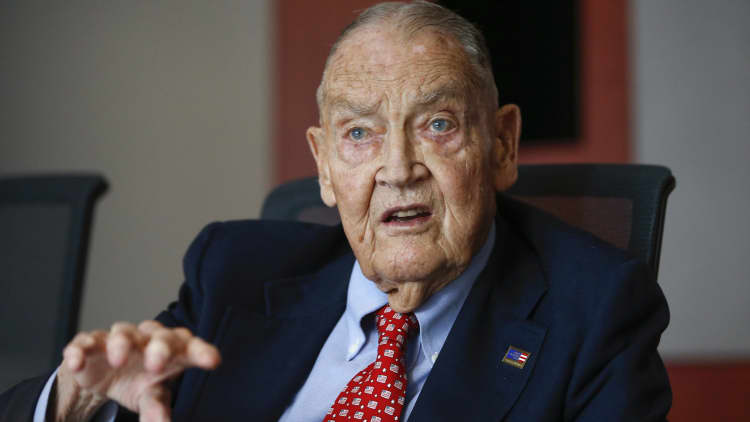A phone call to a bond desk promises just one thing—a depressing rundown of all the things markets could possibly fret about. Right now, they're worried about President Donald Trump.
The concerns are obviously not irreversible, but they took on a new flavor this week on several fronts. First, there was a geopolitical tone, with a new hawkish view of an untested president, as he warned the U.S. could go it alone against North Korea if necessary and blamed Russia for the chemical attack in Syria.
The U.S. showed a new bravado, firing cruise missiles at a Syrian air base and on Thursday, dropping the biggest non-nuclear bomb ever on Afghanistan. Treasury yields fell, moving inversely to prices, as traders worried about the potential for a North Korea missile launch this weekend in celebration of its founders day. They also were concerned the U.S. could react.
The iShares Barclays 20-plus year Treasury Bond ETF, a proxy for the bond market, jumped more than 2 percent since Friday, while the S&P 500 lost 1 percent in the four-day week.
"This is a man who was an isolationist—America first, who now seems to be more aggressive on the geopolitics front," said David Ader, chief macro strategist at Informa Financial Intelligence.
Then there was the about-face on a number of other things. In an interview with the Wall Street Journal Wednesday, the president reversed himself on a campaign pledge to call out China as a currency manipulator.
Trump also said he was undecided about reappointing Fed Chair Janet Yellen, when during his campaign there were thoughts he could even force her to leave before the end of her term. Then there was the reversal of his view on the Export-Import bank, which he suddenly now supports.
While these reversals were not all seen as negatives by the market, they just raise doubts about what Trump's promises have meant and whether he will keep those most important to markets—on tax reform, deregulation and fiscal stimulus. Treasury yields have crept lower as these policies have seemed less certain, with interest rates breaking through an important range this week.

"Geopolitical concerns are certainly the driver," said BMO fixed income strategist Aaron Kohli of the broader move lower. But he said yields started falling in earnest several weeks ago, when Republicans failed to vote on the health care bill, disappointing investors who were hoping Washington would complete that and move quickly to tax reform.
"We had the risk-on euphoria because either taxes were going to be lower and growth was going to increase… now we have to deal with the postponement of the fiscal stimulus to pave way for some health care reform, which is a huge uncertainty," said Ader.
As doubts about Trump and his agenda have risen, buying in bonds has intensified, driving the 10-year Treasury yield back to lows last seen in November. This week the concerns about North Korea, Syria, Russia and the French election, all combined to help push yields below the bottom of the 2.30 percent to 2.60 percent range they've been in since around the November election. The 10-year yield touched 2.21 percent early Friday and was 2.23 percent late in the day, down from last Friday's close of 2.373 percent. Strategists say it could move lower depending on events.
This week, the president also said he would tackle health-care reform first, casting more doubt on the timing of tax reform. In the newspaper interview, he also said the dollar was too strong and that he likes low rates, suggesting to some in the bond markets that he sees a tax plan that would add to the deficit, unlike the plan by House Republicans.
"We've been wavering back and forth on health care and tax reform. Now he's back to health care," said Marc Chandler, chief currency strategist at Brown Brothers Harriman. Chandler said the markets are unclear on how to read some of these comments, but at the end of the day political figures have less clout than other factors on currency and bonds.
"It's more the unwinding of the Trump hype," said Sam Stovall, chief investment strategist at CFRA. "This is the gripe I worried about…he keeps going after the windmills of health care. He's using up very valuable political capital which would be much better spent on tax reform and infrastructure spending."
So far the stock market losses have not been large, but bond strategists say if the stock market begins to focus on the delay in policy, that could prompt a sell-off that could send even more buyers into bonds.
"One of the reasons rates jumped [after the election] was optimism on faster growth driven by tax policy. We're taking away some of that excitement," said Peter Boockvar, chief market analyst at the Lindsey Group.
"We can't separate the Fed raising rates in a very slow economy," said Boockvar, adding the Fed action could also be sending yields lower. "We have growth of less than 1 percent and the Fed is on a rate hiking cycle."
But the growth cycle comes back to Trump. The president had promised he would spark higher growth but the longer it takes to get to the stimulative policy, the more elusive the economic growth .
"If the U.S. has 3 percent growth like he thinks we can achieve, and Europe is struggling at 1 percent growth, how do we get a weaker dollar," said Chandler.
Watch: Bogle says stocks will do better than bonds



